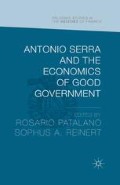Abstract
Understanding the work of Antonio Serra requires some knowledge, however basic, of the economic, monetary, and banking situation in the Kingdom of Naples at the time when Serra wrote his Breve trattato.1 The history of ideas consists all too often in making authors say what they ought to have said, what they are thought to have said, or what we imagine anticipates some later theory or another. Serra’s treatise, it is helpful to remind ourselves, was published in 1613. So it was probably written a few years before then. The two Discorsi of Marc’Antonio de Santis, against which Serra explicitly reacts, were written and presented in 1605 and 1606.2 The time lapse between their interventions, of more than six years, raises the question of what the real purpose of Serra’s Breve trattato actually was.
Access this chapter
Tax calculation will be finalised at checkout
Purchases are for personal use only
Preview
Unable to display preview. Download preview PDF.
Notes
Serra, A. Breve trattato delle cause che possono far abbondare li regni d’oro et d’argento, dove non sono miniere, con applicazione al regno di Napoli; del Dr. Antonio Serra, … diviso in tre parti, Naples: L. Scorriggio, 1613.
de Santis, M.A., “Discorso intorno alli effetti che fa il cambio in regno” (1605), in Colapietra, R. (ed.), Problemi monetari negli scrittori napoletani del Seicento, Rome: Accademia Nazionale dei Lincei, 1973, pp. 111–141, and
and Serra, A., A “Short Treatise” on the Wealth and Poverty of Nations (1613), Reinert, S.A. (ed.), London: Anthem, 2011.
Kirk, T., “A Little Country in a World of Empires: Genoese Attempts to Penetrate the Maritime Trading Empires in the Seventeenth Century”, Journal of European Economic History, 25, 1996, pp. 407–424.
Tracy, J. (ed.), The Political Economy of Merchant Empires: State Power and World Trade, 1350–1750, Cambridge: Cambridge University Press, 1990.
Mandich, G., Le Pacte de Ricorsa et le marché Italien des changes au XVIIe siècle, Paris: S.E.V.P.E.N,, 1953, pp. 54–62
Martinez Ruiz, J.J., “The Credit Market and Profit from Letters of Exchange: Ricorsa Exchange Operations between Seville and The Besançon Fairs, 1589–1621”, Journal of European Economic History, 33, 2004, pp. 331–358.
Grendi, E., “Counterfeit Coins and Monetary Exchange Structures in the Republic of Genoa during the Sixteenth and Seventeenth Centuries”, in, Muir, E. & G. Ruggiero (eds), History from Crime, Baltimore: Johns Hopkins University Press, 1994, pp. 170–205.
Lovett, A., “The General Settlement of 1577: An Aspect of Spanish Finance in the Early Modern Period”, Historical Journal, 25, 1982, pp. 1–22
De Maddalena, A. and H. Kellebenz, La Repubblica internazionale del denaro tra XV e XVII secolo, Bologna: Il Mulino, 1986.
Braudel, F., Civilisation matérielle et capitalisme, 3 vols, Paris: Armand Colin, Paris, 1979, vol. 3, p. 112.
Aymard, M., “La fragilità di un economia avanzata: l’Italia e le trasformaioni dell’economia europea”, in Romano, R. (ed.), Storia dell’economia Italiana, vol. II, Turin: Einaudi, 1991, p. 77.
Braudel, F., Civilisation matérielle et capitalisme, 3 vols., Paris: Armand Colin, 1979, vol. 3, p. 100.
De Rosa, L., “Economic Crisis in the Kingdom of Naples in the Days of Philip II”, Journal of European Economic History, 28, 1999, pp. 511–534.
de Ruble, A., Le Traité de Cateau-Cambrésis (2 et 3 Avril 1559), Paris: Éditions Labitte & Émile-Paul, 1889
L. Romier, L., Les origines politiques des guerres de Religion. Vol. II: La Fin de la magnificence extérieure, le roi contre les protestants (1555–1559), Paris: Perrin et Cie, 1913–1914.
De Rosa, L., “The De-Industrialization of the Kingdom of Naples in the Sixteenth and Seventeenth Centuries”, in Van der Wee, H. (ed.), The Rise and Decline of Urban Industries in Italy and the Low Countries (Late Middle Ages — Early Modern Times), Leuven: Leuven University Press, 1988, pp. 121–138
Galasso, G., “Trends and Problems in Neapolitan History in the Age of Charles V”, in Calabria, A. and J.M. Marino (eds), Good Government in Spanish Naples, New York: Peter Lang, 1990, pp. 13–78.
Rosselli, A., “Early Views on Monetary Policy: The Neapolitan Debate on the Theory of Exchange”, History of Political Economics, 32, 2000, p. 61 and
De Rosa, L., I cambi esteri del Regno di Napoli dal 1591 al 1707, Naples: Banco di Napoli, 1955, p. 3
Palmieri, N., La fede di credito del Banco di Napoli, Rome: Officina poligrafica italiana, 1905
De Roover, R., L’évolution de la lettre de change, XIVe-XVIIIe siècles, Paris: A. Colin, 1953, p. 76
Goschen, The Theory of the Foreign Exchanges, London: E. Wilson, 1926, p. 2.
Fournial, E., Histoire monétaire de l’Occident médiéval, Paris: F. Nathan, 1970, p. 27.
See Casella, A., “de Santis, Marc’Antonio”, in Dizionario Biografico degli Italiani, vol. 39 (1991).
de Santis, M.A., Discorso intorno alli effetti che fa il cambio in regno, Naples, 1605, pp. 2–4.
Avallone, P., Stato e Banchi Publici a Napoli a Metà del 700, Naples: Edizioni scientifiche italiane, 1995, pp. 12–18.
de Santis, M.A., Secondo discorso intorno agli effetti che fa il cambio in regno. Sopra una risposta, che è stata fatta avverso del primo, Naples, 1605.
Roncaglia, A., The Wealth of Ideas: A History of Economic Thought, Cambridge: Cambridge University Press, 2005, p. 48
Sumberg, T.A., “Antonio Serra: A Neglected Herald of the Acquisitive System”, American Journal of Economics and Sociology, vol. 50, no. 3, 1991, pp. 365–373.
Editor information
Editors and Affiliations
Copyright information
© 2016 André Tiran
About this chapter
Cite this chapter
Tiran, A. (2016). Real and Monetary Factors in the de Santis-Serra Controversy. In: Patalano, R., Reinert, S.A. (eds) Antonio Serra and the Economics of Good Government. Palgrave Studies in the History of Finance. Palgrave Macmillan, London. https://doi.org/10.1057/9781137539960_10
Download citation
DOI: https://doi.org/10.1057/9781137539960_10
Publisher Name: Palgrave Macmillan, London
Print ISBN: 978-1-349-71199-4
Online ISBN: 978-1-137-53996-0
eBook Packages: Economics and FinanceEconomics and Finance (R0)

